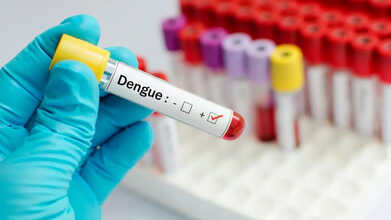- Health Conditions A-Z
- Health & Wellness
- Nutrition
- Fitness
- Health News
- Ayurveda
- Videos
- Medicine A-Z
- Parenting
Dengue And Painkillers: Here's Why Consuming Ibuprofen And Aspirin Should Be Avoided During Dengue

Credits: Canva
Dengue is a viral disease transmitted to humans through the bite of infected mosquitoes. According to the World Health Organization (WHO), nearly half of the global population is at risk, with an estimated 100 to 400 million infections occurring each year. With dengue being so common, we recently held a panel discussion to talk about prevention, precautions, treatment, and medication. A major focus of the discussion was the role of medicines, what to take, what to avoid, and how to manage symptoms safely. But what medicine should you consume and which one is more safe to take?
What Medicines Are Safe During Dengue?
During the panel, Padma Shri awardee Dr Sanjeev Bagai, Chairman of Nephron Clinic and Senior Consultant Paediatrician, highlighted that paracetamol is the only safe option for dengue patients. He said, “Paracetamol is the only recommended treatment. Avoid medicines like aspirin, ibuprofen, or niacinamide, as these can worsen the condition and increase the risk of bleeding. Taking them is a sure ticket to the hospital.”
This advice is backed by government regulations as well. In July 2025, the Delhi government’s Department of Drugs Control instructed pharmacists not to sell nonsteroidal anti-inflammatory drugs (NSAIDs) such as aspirin, ibuprofen, and naproxen without a doctor’s prescription. NSAIDs interfere with platelet function, which can be particularly dangerous for dengue and other vector-borne illnesses like chikungunya.
Why Aspirin and Ibuprofen Can Be Dangerous?
NSAIDs are commonly used to relieve pain, reduce inflammation, and bring down high fever. They are often taken for headaches, muscle aches, sprains, or menstrual cramps, symptoms that may appear during dengue.Therefore, people often prefer to take them during dengue fever as well.
Aspirin, for example, reduces fever and pain at high doses and prevents platelet aggregation at lower doses. But in dengue patients, this antiplatelet effect can trigger uncontrolled bleeding, especially in the gastrointestinal tract, making the illness far more severe.
Ibuprofen, while slightly less potent in affecting platelets, still carries a similar risk. Any medicine that interferes with clotting can turn a mild dengue infection into a serious medical emergency. This is why avoiding NSAIDs during dengue is strongly advised.
How Is Dengue Treated?
There is currently no specific antiviral treatment for dengue. Recovery mostly depends on complete bed rest and symptom management. Drinking plenty of fluids is important, as it helps the body cope with fever and prevents dehydration. As Dr Bagai said, taking paracetamol is also suggested.
For severe cases, hospital care is necessary. This could include intravenous fluids to maintain hydration, monitoring blood pressure, and blood transfusions if there is significant blood loss or a dangerously low platelet count.
However, Dr Bagai emphasized that hydration is as important as medicine. Fluids such as water, oral rehydration solutions, or electrolyte drinks support recovery and help prevent complications.
Dengue is a serious but manageable illness when handled correctly. The key takeaways are clear: stick to paracetamol for pain and fever, avoid NSAIDs like aspirin and ibuprofen, and maintain proper hydration. Following these guidelines can help patients recover safely.
Hong Kong Fire: Essential Do’s and Don’ts You Must Follow During A Fire Emergency

Credits: AP
At least 55 people have lost their lives and 279 remain missing after Hong Kong’s most severe fire in more than a century swept through several high-rise towers on Wednesday afternoon, officials said. Fire crews are still trying to put out the blaze in the Tai Po area and reach those who are trapped inside. By early Thursday, authorities said they had managed to control the fire in four buildings, though teams were still working on three others more than 16 hours after the flames first appeared.
What Happened in Hong Kong?
A residential complex in the Tai Po district caught fire at around 2:51pm local time on Wednesday. The flames started on the bamboo scaffolding fixed to the outside of one of the buildings. This scaffolding, made of bamboo poles used by workers during repairs, burns very easily. Once it caught fire, the flames moved quickly up the outside of the building, spread into the apartments, and then reached nearby towers.
The blocks were also covered in green construction netting from the ground to the roof because renovation work was taking place. This netting caught fire as well and helped the flames advance at a faster pace. Local reports noted that the fire grew at incredible speed. By 3:34pm, it had reached a level four alarm, and by 6:22pm, it had been raised to a level five alarm, the highest alert in Hong Kong. It is now the deadliest fire the city has seen in more than 100 years.
Hong Kong Fire: How Did The Fire Start?
The blaze spread in minutes because it began on the bamboo scaffolding around the building and moved to the green netting covering the towers. Both materials burn very easily. Once they ignited, the flames climbed the outside of the tower and reached many floors above. Burning fragments then dropped to the ground and set nearby buildings on fire within minutes. Wind and the open gaps created during the renovation work likely pushed the flames even faster. While officials are still examining the exact cause, they said that the flammable scaffolding, the construction materials, and the tall buildings standing close together all played a part in letting the fire grow out of control, according to Al Jazeera.
Hong Kong Fire: Essential Safety Tips To Keep In Mind During A Fire Emergency
As per The American Red Cross society, here are some essential safety tips you should follow during incase a fire emergency strucks.
Smoke Alarms:
- Make sure your home is fitted with working smoke alarms.
- Place an alarm on every level of your home including inside each bedroom and outside every sleeping area. Connect the alarms so that they all sound together.
- Install alarms and alert tools to help family members who are deaf or hard of hearing.
- Alert tools such as strobe lights flash when the alarm rings. Pillow or bed shakers can help wake someone who is sleeping. These devices are triggered by the sound of the smoke alarm and shake the bed to warn the person about the fire.
- Test each alarm at least once a month. Press the test button to check that it works.
- Visit the Consumer Product Safety Commission website for details on smoke alarms that may have been recalled.
Home Escape Plan
- Create a home escape plan that includes two ways out of every room. Share this plan with all family members and guests.
- The plan should show two clear exits from each room and a meeting point outside the home.
- Make sure everyone in the house knows the plan.
- Practice your fire drill regularly.
- Ensure that children, older adults, and people with disabilities have the help they need during an escape.
- Keep stairways well lit to prevent falls.
- Clear clutter so no one trips while trying to leave quickly.
- Add handrails along both sides of staircases.
- If you live in an apartment, know where all exit staircases are located on your floor in case the nearest one is blocked by smoke or flames. Always use the stairs to leave the building. Do not use the elevator unless the fire department says you can.
Fire Response
- If there is a fire, get out quickly and stay outside. Then call 9-1-1.
- If you cannot leave the building, call 9-1-1 and tell the fire department you are unable to get out. Wave a light coloured cloth or a flashlight near the window to signal for help, but keep the window closed.
- If you see smoke, use your second escape route. If you must move through smoke, stay low and crawl under it.
After Criticism From Doctors, Sonali Bendre Explains Her View on Naturopathy For Cancer Treatment

Credits: Wikimedia Commons
Sonali Bendre, actor, who is known for talking about her cancer journey, inspiring other survivors to talk about it too, has found herself at the center of a heated debate after she spoke how naturopathy and autophagy helped her in her cancer recovery.
Bendre, who was diagnosed with stage 4 metastatic endometrial cancer in 2018, wrote on X that she believes autophagy played a role in her healing journey. Her post quickly drew sharp criticism from several doctors.
Doctors Point Out That Cancer Remission Came Through Medical Treatment
Members of the medical community reminded her that her remission was the result of evidence-based cancer treatments, including chemotherapy, radiation and surgery. Many emphasized that autophagy is not a recognized medical therapy and should not be presented as one.
One post from hepatologist Dr Cyriac Abby Philips on X said, “Your cancer went into remission after chemotherapy, radiation, and surgery at an advanced cancer treatment hospital. Not because of Naturopathy. Not because of autophagy. Because you have the option and privilege to opt for the best treatments from scientific practice to help you.”
Bendre Clarifies Her Stand
Following the criticism, Bendre clarified that she was sharing her personal experience as a survivor, not medical advice. She wrote that her journey included elements she explored with the help of her naturopath, and these practices were only part of her overall healing process. In her words, “I have never claimed to be a doctor, but I am certainly not a quack either. I am a cancer survivor, someone who has lived through the fear, pain, uncertainty, and rebuilding that the disease brings.”
What Autophagy Actually Is
Autophagy is a natural process in which the body breaks down and recycles old or damaged cell components. Cells contain various structures that help them function, and over time some of these structures wear out. Autophagy acts like a clean-up and recycling system. It allows cells to dismantle faulty parts and reuse the useful components to maintain healthy cell function. Anything that cannot be used is removed by the cell.
This process is an important quality control mechanism. If too much cellular waste builds up, it can interfere with normal cell activity. Autophagy helps keep cells efficient and healthy. The scientific understanding of autophagy grew significantly after Japanese biologist Yoshinori Ohsumi won the Nobel Prize in Medicine in 2016 for his work uncovering how it works. While autophagy is essential for survival, it is not considered a medical treatment for diseases.
Can Autophagy Treat Cancer?
Experts explain that autophagy plays a complicated role in cancer. In the early stages, it may help prevent tumor formation by clearing damaged components. However, in established cancers, the same process can allow tumor cells to survive stress and become more resistant to treatments like chemotherapy.
Disclaimer: Please consult a qualified doctor or oncologist before choosing any treatment for cancer. Health and Me does not endorse alternative therapies as substitutes for evidence-based medical care. This article is based on publicly available information. All medical conditions should be evaluated and managed under the guidance of a licensed healthcare professional.
E-Cigarettes Carry Fecal Bacteria Like E. Coli And More, More Details Inside

Credits: iStock and Canva
What if you are told that the vape you are using contains bacteria found in poop. You read that right. According to a study conducted by HAYPP along with Microbiologist Reynold Mpofu at BioLabTests, bacteria like staphylococcus and bacillus were found on vape, as well as fecal bacterium, E. coli is found on vape, which is often found in public bathroom.
What Did The Study Find?
More than 100 million people worldwide use e-cigarettes or vapes, and at least 1 in 6 people vape in toilet. Furthermore, vapes are rarely cleaned, and thus become germ hotspots.
The study found that vape mouthpieces are highly contaminated with bacteria. More than 1.5 million colony-forming unites or CFUs were identified on the vape mouthpiece, the maximum amount measurable by the lab, carrying as many as 2,300 times more bacteria than a public toilet, which has 50 CFUs per square inch.
“Laboratory analysis revealed that the mouthpiece is the dirtiest component of the vape. This isn’t surprising given that the human mouth, largely considered to be one of the ‘dirtiest’ parts of the body, harbors approximately 700 species of bacteria, that amounts to billions of individual bacteria,” said Mpofu.
The study was able to identify a range of bacteria, including skin microbes to gut bacteria like E.coli.
Also Read: UK Investigates Impact Of Vaping On Its Young Users
The Species Identified
The study identified these following bacteria on the vape:
- Bacillus: commonly found in dust and the air
- E.coli: indicates possible fecal contamination
- Yeast and mold: can cause respiratory irritation
- Staphylococcus: usually harmless, but could cause infection
- Enterococcus: intestinal bacteria that can persist on surfaces
The study was also able to identify bacteria on the vape body. The lab also observed a rapid microbial growth between just 2 to 3 days of use. These colonies could be seen multiplying thousand of times over.
While many of these are found on human skin or surrounding, some are intestinal bacteria, like aforementioned, E.coli, and Enterococcus, which points towards unwashed hands, explaining the transfer on the surface.
“Much like phones, vapes are frequently handled and placed on a variety of surfaces, allowing germs, oils, and dirt from hands, pockets and various environments to latch on the device. The findings confirmed the presence of bacteria, including E. coli and Enterococcus, on the vape body, likely arising from inadequate hand hygiene or the transfer of microorganisms from bathroom environments or other contaminated surfaces,” said Mpofu.
Read: Why Is My Idea Of Break Is To Have A Smoke?
The Timeline Of Bacteria Development
The first signs of microbes start to appear within the first day of buying a brand new vape, especially around the mouthpiece.
By day three, the vape accumulates more than 2,300 times the microbial load typically found on a toilet seat.
By the seventh day, bacteria like E.coli. and Enterococcus and other fecal indicators are detected on the mouthpiece and vape’s body. Mould and bacteria are also found on levels.
By day 14, despite no new use or cleaning, the vape remains heavily contamination. The contamination does not fade overtime.
© 2024 Bennett, Coleman & Company Limited

